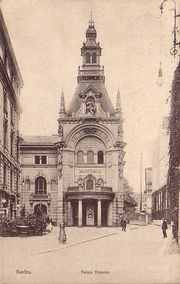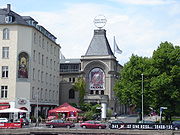
Theater am Schiffbauerdamm
Encyclopedia

Mitte
Mitte is the first and most central borough of Berlin. It was created in Berlin's 2001 administrative reform by the merger of the former districts of Mitte proper, Tiergarten and Wedding; the resulting borough retained the name Mitte. It is one of the two boroughs which comprises former West and...
district of Berlin
Berlin
Berlin is the capital city of Germany and is one of the 16 states of Germany. With a population of 3.45 million people, Berlin is Germany's largest city. It is the second most populous city proper and the seventh most populous urban area in the European Union...
, Germany
Germany
Germany , officially the Federal Republic of Germany , is a federal parliamentary republic in Europe. The country consists of 16 states while the capital and largest city is Berlin. Germany covers an area of 357,021 km2 and has a largely temperate seasonal climate...
, opened on November 19, 1892. Since 1954 it is home to the Berliner Ensemble
Berliner Ensemble
The Berliner Ensemble is a German theatre company established by playwright Bertolt Brecht and his wife, Helene Weigel in January 1949 in East Berlin...
theatre company, founded in 1949 by Helene Weigel
Helene Weigel
Helene Weigel was a distinguished German actress. She was the second wife of Bertolt Brecht, and together they had a son Stefan Brecht and daughter Barbara Brecht-Schall .The daughter of a Jewish lawyer, she became a Communist Party member from 1930 and Artistic Director of the...
and Bertolt Brecht
Bertolt Brecht
Bertolt Brecht was a German poet, playwright, and theatre director.An influential theatre practitioner of the 20th century, Brecht made equally significant contributions to dramaturgy and theatrical production, the latter particularly through the seismic impact of the tours undertaken by the...
.
The original name of the Neo-baroque
Neo-baroque
The Baroque Revival or Neo-baroque was an architectural style of the late 19th century. The term is used to describe architecture which displays important aspects of Baroque style, but is not of the Baroque period proper—i.e., the 17th and 18th centuries.Some examples of Neo-baroque architecture:*...
construction by the architect Heinrich Seeling
Heinrich Seeling
Heinrich Seeling was a German architect....
was Neues Theater. The first performance was Johann Wolfgang von Goethe
Johann Wolfgang von Goethe
Johann Wolfgang von Goethe was a German writer, pictorial artist, biologist, theoretical physicist, and polymath. He is considered the supreme genius of modern German literature. His works span the fields of poetry, drama, prose, philosophy, and science. His Faust has been called the greatest long...
's play Iphigenie auf Tauris
Iphigenie auf Tauris
Iphigenia in Tauris is a reworking by Johann Wolfgang von Goethe of the ancient Greek tragedy Ἰφιγένεια ἐν Ταύροις, Iphigeneia en Taurois, by Euripides. Goethe's chosen Latinized title for his work, however, is a false analogy to the title of Euripides's tragedy, which really means "Iphigenia...
. Die Weber, a naturalistic
Naturalism (theatre)
Naturalism is a movement in European drama and theatre that developed in the late 19th and early 20th centuries. It refers to theatre that attempts to create a perfect illusion of reality through a range of dramatic and theatrical strategies: detailed, three-dimensional settings Naturalism is a...
drama by Gerhart Hauptmann
Gerhart Hauptmann
Gerhart Hauptmann was a German dramatist and novelist who received the Nobel Prize in Literature in 1912.-Life and work:...
had its premiere in a private audience at the theatre on February 26, 1893. From 1903 to 1906 the Neues Theater was under the management of Max Reinhardt
Max Reinhardt
----Max Reinhardt was an Austrian theater and film director and actor.-Biography:...
; it later became the site of numerous operetta
Operetta
Operetta is a genre of light opera, light in terms both of music and subject matter. It is also closely related, in English-language works, to forms of musical theatre.-Origins:...
performances.
With the premiere of the comedy Der fröhliche Weinberg by Carl Zuckmayer
Carl Zuckmayer
Carl Zuckmayer was a German writer and playwright.-Biography:Born in Nackenheim in Rheinhessen, he was four years old when his family moved to Mainz. With the outbreak of World War I, he finished school with a facilitated "emergency"-Abitur and volunteered for military service...
on December 22, 1925 the theatre returned to dramatic art, followed by the first performances of The Threepenny Opera
The Threepenny Opera
The Threepenny Opera is a musical by German dramatist Bertolt Brecht and composer Kurt Weill, in collaboration with translator Elisabeth Hauptmann and set designer Caspar Neher. It was adapted from an 18th-century English ballad opera, John Gay's The Beggar's Opera, and offers a Marxist critique...
(Die Dreigroschenoper) on August 31, 1928 and of the Italienische Nacht by Ödön von Horváth
Ödön von Horváth
Edmund Josef von Horváth was a German-writing Austro-Hungarian-born playwright and novelist...
on March 20, 1931. Bertolt Brecht staged Marieluise Fleißer
Marieluise Fleißer
Marieluise Fleißer was a German author and playwright.Her best known works are two plays, Purgatory in Ingolstadt and Pioneers in Ingolstadt . Bertolt Brecht persuaded the director Moriz Seeler to stage the first play, which Seeler retitled; Fleißer's original title was The Washing of Feet....
's play Pioneers in Ingolstadt
Pioneers in Ingolstadt
Pioneers in Ingolstadt is a play by German playwright Marieluise Fleißer, which premiered on 25 March 1928 in Dresden. The play is set in 1926 and is described as a comedy in 14 Scenes. Fleißer based the play on real incidents, and worked on it in collaboration with Bertolt Brecht...
on March 30, 1929, causing a veritable scandal. The theatre saw Gustaf Gründgens
Gustaf Gründgens
Gustaf Gründgens , born Gustav Heinrich Arnold Gründgens, was one of Germany's most famous and influential actors of the 20th century, intendant and artistic director of theatres in Berlin, Düsseldorf, and Hamburg...
giving his debut as a director with Jean Cocteau
Jean Cocteau
Jean Maurice Eugène Clément Cocteau was a French poet, novelist, dramatist, designer, playwright, artist and filmmaker. His circle of associates, friends and lovers included Kenneth Anger, Pablo Picasso, Jean Hugo, Jean Marais, Henri Bernstein, Marlene Dietrich, Coco Chanel, Erik Satie, María...
's Orphée and guest performances by the Truppe 31 stage company of Gustav von Wangenheim
Gustav von Wangenheim
Gustav von Wangenheim was a German actor, screenwriter and director.- Life :Wangenheim was born Ingo Clemens Gustav Adolf Freiherr von Wangenheim in Wiesbaden, Hesse, to parents Eduard Clemens Freiherr von Wangenheim and Minna Mengers...
.

Lotte Lenya
Lotte Lenya was an Austrian singer, diseuse, and actress. In the German-speaking and classical music world she is best remembered for her performances of the songs of her husband, Kurt Weill. In English-language film she is remembered for her Academy Award-nominated role in The Roman Spring of Mrs...
, Carola Neher
Carola Neher
- Biography :Neher was born in Munich to a music teacher in 1900. She started to work as a bank clerk in 1917. In the summer of 1920, she gave her debut performance at the Baden-Baden theater without a specific stage education, later also working at the theaters of Darmstadt, Nuremberg and at the...
, Hilde Körber
Hilde Körber
Hilde Körber was a German film actress. She appeared in 53 films between 1930 and 1964.She was born in Vienna, Austria and died in Berlin, Germany.-Selected filmography:* The Great King * Morituri...
, Helene Weigel
Helene Weigel
Helene Weigel was a distinguished German actress. She was the second wife of Bertolt Brecht, and together they had a son Stefan Brecht and daughter Barbara Brecht-Schall .The daughter of a Jewish lawyer, she became a Communist Party member from 1930 and Artistic Director of the...
, Ernst Busch
Ernst Busch (actor)
Ernst Busch was a German singer and actor.Busch first rose to prominence as an interpreter of political songs, particularly those of Kurt Tucholsky, in the Berlin Kabarett scene of the 1920s...
, Ernst Deutsch
Ernst Deutsch
Ernst Deutsch aka Ernest Dorian was an Austrian actor. In 1916 he played the protagonist in the world première of Walter Hasenclever's Expressionist play The Son in Dresden to great acclaim...
, Kurt Gerron
Kurt Gerron
Kurt Gerron was a German Jewish actor and film director.-Life:Born Kurt Gerson into a well-off merchant family in Berlin, he initially studied medicine but was called up for military service in World War I. Seriously wounded he qualified as a military doctor of the German Army...
, Theo Lingen
Theo Lingen
Theo Lingen , born Franz Theodor Schmitz, was a German actor, director and screenwriter. He appeared in over 230 films between 1929 and 1978, and directed 21 films between 1936 and 1960.-Life and career:...
and Peter Lorre
Peter Lorre
Peter Lorre was an Austrian-American actor frequently typecast as a sinister foreigner.He caused an international sensation in 1931 with his portrayal of a serial killer who preys on little girls in the German film M...
. With the Nazi
Nazism
Nazism, the common short form name of National Socialism was the ideology and practice of the Nazi Party and of Nazi Germany...
takeover in 1933 the theatre declined and was finally closed in 1944.
Reopened after World War II
World War II
World War II, or the Second World War , was a global conflict lasting from 1939 to 1945, involving most of the world's nations—including all of the great powers—eventually forming two opposing military alliances: the Allies and the Axis...
it was finally taken over by Bertolt Brecht. Today it is considered one of the most glamorous theatres in Germany and the building is currently undergoing historic preservation
Historic preservation
Historic preservation is an endeavor that seeks to preserve, conserve and protect buildings, objects, landscapes or other artifacts of historical significance...
.

